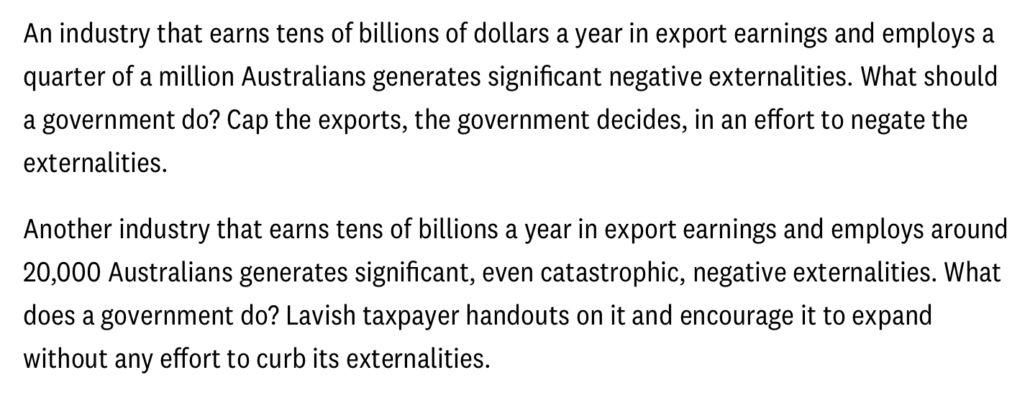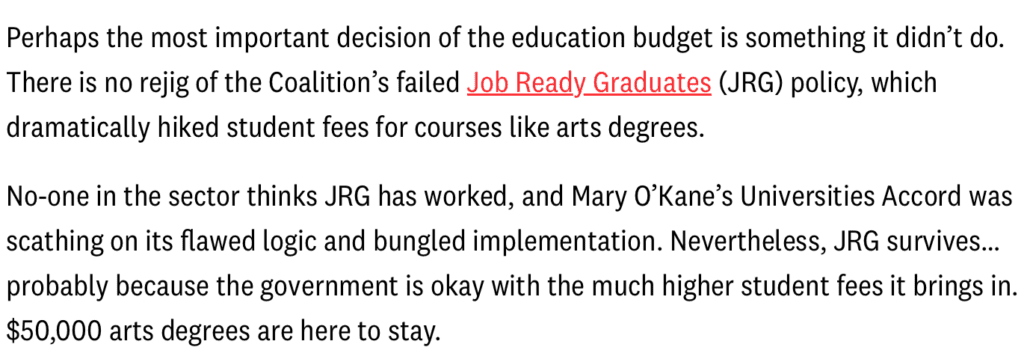
What was and wasn’t in the 2024 Federal Budget?
Many in the tertiary education sector had high expectations for this year’s Federal Budget after their earlier praise for the Universities Accord Panel’s Final Report to government.
In amongst the plethora of conferences, webinars and podcasts which have been hosted over the last few months unpacking all of the apparently substantial reforms contained in the Panel’s Final Report – there was lavish praise for it from a number of university leaders:
“an important piece of work coming at a time when our universities require the full support of government to continue delivering for the nation…”
“this once-in-a-generation opportunity to reimagine the policy landscape in which (universities) operate.”
“strongly supports the focus of the Universities Accord final report and congratulates the Accord Panel”
In reality of course the report was a mishmash of major and minor reforms with no clear blueprint on how to progress any of them.
In fact Prof. O’Kane noted publicly towards the end of the Accord process that the government had not implemented the Panel’s interim recommendations as intended, and she went on to appear to suggest that the Panel was cognisant of this as they worked on their final recommendations.
What a loss for the sector that more work was not done on drawing together a coherent and detailed plan for higher education reform through the Accord process…
The lack of specificity in the Accord Panel’s Final Report has instead delivered a suite of Budget announcements that while positive for students, for many in the sector do not go far enough.
Responses to the Budget announcements ranged from mild enthusiasm to open criticism:
Universities Australia “the Government’s prioritisation of measures to support students in this Budget is timely as we seek to expand our system and the number of students we educate to meet our economic needs.”
Group of Eight “the long-term legacy of this Budget, this Government and its Future Made in Australia initiative will be how it delivers on the challenges in Australia’s higher education and research systems”
Australian Technology Network of Universities “the Australian Technology Network of Universities (ATN) applauds the investment into FEE-FREE Uni Ready courses”
Innovative Research Universities “Student support welcome,but critical higher education reforms left undone”
Regional Universities Network “the 2024-25 Budget is large on rhetoric and promises of sectoral reform but does little to address the pressing needs of Australia’s higher education sector, especially Australia’s regional universities.”
Independent Higher Education Australia “the Budget is a big disappointment… there is very little to support students and providers in the independent sector, while new measures in international education threaten the viability of this industry.”
National Tertiary Education Union “a first step on the road to major reform universities desperately need… “We need thegovernment to be upfront about what its plan to slow the growth of international student numbers means for universityfunding.”
National Union of Students “Welcome relief for students in Budget, but a long way to go”
The two pieces of Budget/tertiary education analysis I found most insightful – both cam from independent news website, Crikey.
In the first, political editor Bernard Keane contrasted the government’s support for two major export earners: international education and gas. He wrote:

In the second, Monash University lecturer and NTEU Branch President, Ben Eltham, drew attention to the lack of any changes to the former government’s Job-ready Graduates funding reforms (which reduced average government funding per university place and sharply increased the amount students in arts and humanities paid for their studies). He wrote:

Keane and Eltham are right in their criticisms – and rather than applauding the Accord Panel for its Final Report – the higher education sector should have decried the lack of specificity within the report and the lack of any concrete recommendations on how to reform the Job-ready Graduates package.
That would have allowed a conversation with government on how to make the necessary reforms sooner. Instead, by kicking reform of the Job-ready Graduates funding down the road to the new Australian Tertiary Education Commission, we will:
- continue to see almost 40% of university students paying 90% of the cost of their courses for the foreseeable future
- continue to see outer-metropolitan and regional universities struggling with a lack of funding for their domestic teaching activities – while still needing to keep their research at world class standards across at least half of the fields of education they teach, and
- see ATEC impose hard limits on the number of domestic and international student numbers each individual university can enrol, and
- see any domestic enrolment growth beyond these government-imposed limits restricted to private universities, university colleges and institutes of higher education (where students will pay full tuition fees).
You can only wonder if this is what the sector anticipated when they lauded the work of the Accord Panel and their recommendations?
International education/VET
For the other parts of the sector there was very little in the Budget.
In international education the lack of attention was a blessing.
The sector had been worried that international student visa application fees could be raised and earlier the Group of Eight had argued against a tax on international student revenues. Neither were included in the Budget papers.
In VET, the Australian government is limited in its ability to reform and fund the sector given constitutional responsibility for VET sits with the States.
Hence the VET sector waits to see the details of the new National Skills Plan (an accompanying document to sit alongside the National Skills Agreement) which will be complemented by State and Territory Action Plans – showing agreed national priorities for skills funding…
And finally – as for the Accord Panel’s apparent commitment to the closer integration of VET and higher education – aside from the important appointment of Jenny DODD (CEO, TAFE Directors Australia) to the Implementation Action Committee to progress the government’s higher education reforms – the Budget included just $27.7m over 4 years to refine existing frameworks/policy statements, specifically:
- facilitate better student pathways between VET and higher education, including through updating the Australian Qualifications Framework Qualifications Pathways Policy
- develop a standard approach to credit recognition arrangements, making it cheaper and more efficient for students to become qualified
- build better data by aligning VET and higher education data sets to better understand student pathways between the sectors and inform future measures to continue to address the invisible barriers between VET and higher education
- commence work to develop a National Skills Taxonomy to make it easier to design higher education and VET qualifications that meet the needs of business and industry
- improve the regulatory approach for dual-sector providers, jointly led by the Tertiary Education Quality and Standards Agency (TEQSA) and the Australian Skills Quality Authority (ASQA), and
- consider applications from TAFEs to become self-accrediting organisations in higher education, and exploring delegation of VET course accreditation to selected TAFEs.
The Budget also included funding for up to 30,000 FEE-FREE university pathways places from 1 January 2025, which in turn may dampen interest in higher level FEE-FREE TAFE places…




